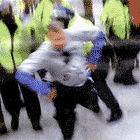 After an inquest finding that Ian Tomlinson was unlawfully killed, solicitors Sarah McSherry and Louise Christian examine the barriers to justice in cases involving the police
After an inquest finding that Ian Tomlinson was unlawfully killed, solicitors Sarah McSherry and Louise Christian examine the barriers to justice in cases involving the police
In circumstances where a man’s assault and death were played out on our television sets, the obstacles faced by the Tomlinson family in their battle for justice undermine public confidence in the system intended to hold police officers to account. Had Tomlinson’s assault been carried out by an ordinary member of the public, there is no doubt that the police would have acted within the six-month statutory time limit for common assault and pursued a manslaughter charge in the knowledge that any conflict in the expert evidence obtained by the investigation would be tested in court. A verdict would then have been reached by a jury, which would have considered the credibility of the experts’ explanations, bearing in mind the professional reputations of the experts. This is exactly what happened at the inquest, where the standard of proof for an unlawful killing verdict was the same as in the criminal court.
This case highlights a number of the failures that are unfortunately so common in the context of our work. These include: failures to adequately supervise and manage officers and to conduct adequate, effective and independent complaint investigations that give rise to disciplinary proceedings, as well as failures to bring about prosecutions and/or appropriate penalties and/or to change police policy or practice to prevent a recurrence of the conduct investigated. These failures foster a culture of impunity amongst officers and allow culpable officers to remain in a position to inflict further harm on unsuspecting members of the public. The Crown Prosecution Service will now review its decision with regard to a potential prosecution of the officer involved, PC Harwood; MPs are considering disciplinary proceedings. But what of those who, in breach of their code of professional standards, witnessed but failed to report Harwood’s conduct? Disciplinary action should be instigated against those officers too, given that had the video footage of his last moments not been released, the cause of Tomlinson’s death may have never come to light.
Finally, this case gives rise to serious questions about the use of kettling as a “containment” tactic. Indeed, last month the High Court ruled that the Metropolitan Police broke the law when they kettled protesters at the G20 demonstrations in 2009, during which Ian Tomlinson died. It is clear that the use of kettles enforced by aggressive policing places members of the public at risk of significant harm. We represent Alfie Meadows, who suffered brain injury as the result of a baton strike to the head by a police officer during the 9 December 2010 protest about tuition fees. Luckily for Alfie, he is able to pursue his own quest for justice. Tomlinson was not so fortunate and his family have been forced to take up that struggle on his behalf. Let’s hope their campaign is nearing its rightful conclusion.
Sarah McSherry is equity partner, head of actions against the police, Christian Khan Solicitors and Louise Christian is head of public law, Christian Khan Solicitors





